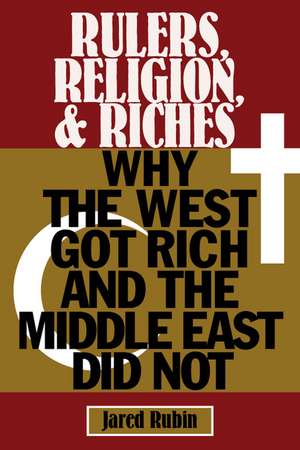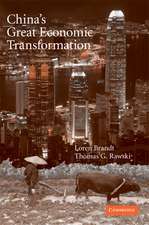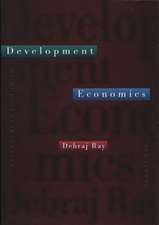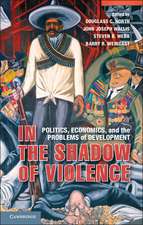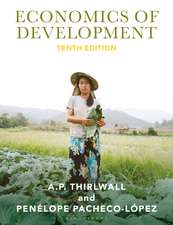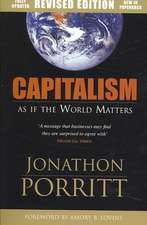Rulers, Religion, and Riches: Why the West Got Rich and the Middle East Did Not: Cambridge Studies in Economics, Choice, and Society
Autor Jared Rubinen Limba Engleză Paperback – mar 2017
| Toate formatele și edițiile | Preț | Express |
|---|---|---|
| Paperback (1) | 219.90 lei 43-57 zile | |
| Cambridge University Press – mar 2017 | 219.90 lei 43-57 zile | |
| Hardback (1) | 700.76 lei 43-57 zile | |
| Cambridge University Press – 15 feb 2017 | 700.76 lei 43-57 zile |
Din seria Cambridge Studies in Economics, Choice, and Society
-
 Preț: 243.55 lei
Preț: 243.55 lei -
 Preț: 163.31 lei
Preț: 163.31 lei -
 Preț: 135.65 lei
Preț: 135.65 lei -
 Preț: 176.62 lei
Preț: 176.62 lei -
 Preț: 197.90 lei
Preț: 197.90 lei -
 Preț: 166.79 lei
Preț: 166.79 lei -
 Preț: 176.86 lei
Preț: 176.86 lei -
 Preț: 278.72 lei
Preț: 278.72 lei -
 Preț: 203.50 lei
Preț: 203.50 lei -
 Preț: 252.69 lei
Preț: 252.69 lei -
 Preț: 363.07 lei
Preț: 363.07 lei -
 Preț: 288.62 lei
Preț: 288.62 lei -
 Preț: 205.41 lei
Preț: 205.41 lei -
 Preț: 299.62 lei
Preț: 299.62 lei -
 Preț: 262.24 lei
Preț: 262.24 lei -
 Preț: 259.34 lei
Preț: 259.34 lei -
 Preț: 228.08 lei
Preț: 228.08 lei - 14%
 Preț: 725.57 lei
Preț: 725.57 lei -
 Preț: 291.68 lei
Preț: 291.68 lei -
 Preț: 290.38 lei
Preț: 290.38 lei - 11%
 Preț: 693.69 lei
Preț: 693.69 lei - 11%
 Preț: 705.18 lei
Preț: 705.18 lei
Preț: 219.90 lei
Nou
Puncte Express: 330
Preț estimativ în valută:
42.08€ • 44.04$ • 35.02£
42.08€ • 44.04$ • 35.02£
Carte tipărită la comandă
Livrare economică 31 martie-14 aprilie
Preluare comenzi: 021 569.72.76
Specificații
ISBN-13: 9781108400053
ISBN-10: 1108400051
Pagini: 296
Ilustrații: 12 b/w illus. 8 maps 19 tables
Dimensiuni: 152 x 228 x 16 mm
Greutate: 0.45 kg
Editura: Cambridge University Press
Colecția Cambridge University Press
Seria Cambridge Studies in Economics, Choice, and Society
Locul publicării:New York, United States
ISBN-10: 1108400051
Pagini: 296
Ilustrații: 12 b/w illus. 8 maps 19 tables
Dimensiuni: 152 x 228 x 16 mm
Greutate: 0.45 kg
Editura: Cambridge University Press
Colecția Cambridge University Press
Seria Cambridge Studies in Economics, Choice, and Society
Locul publicării:New York, United States
Cuprins
1. Introduction; Part I. Propagation of Rule: A Theory of Economic Success and Stagnation: 2. The propagation rule; 3. Historical origins of rule propagation; Part II. Applying the Theory: Why the West Got Rich and the Middle East Did Not: 4. Bans on taking interest; 5. Restrictions on the printing press; 6. Printing and the Reformation; 7. Success: England and the Dutch Republic; 8. Stagnation: Spain and the Ottoman Empire; 9. Conclusion.
Recenzii
'In a fascinating analysis of why the Middle East fell behind, Jared Rubin points to events centuries ago that led the Middle East and the West to different sources of political legitimacy and different paths of institutional change. His insight not only explains why political autocracy and economic stagnation have dominated the Middle East but why our policies there seem to fail.' Philip Hoffman, California Institute of Technology
'In the early Middle Ages, the Muslim Mediterranean world was technologically progressive and sophisticated and had a flourishing economy, while Western Europe was a poor backwater. In modern times, north-west Europe took the lead and became the cradle of economic growth. What explains this momentous reversal of fortune? In a fresh and original work, Rubin combines history, economics, and politics to come up with a startling new explanation that will have scholars arguing the matter for years.' Joel Mokyr, Northwestern University, Illinois
'Jared Rubin is among the boldest and most creative young scholars of political economy today. His highly entertaining and enlightening book is a path-breaking magnum opus in the burgeoning field of economics of religion. Rulers, Religion, and Riches restores the pertinent role of secularism in sociopolitical and economic development to its rightful place.' Murat Iyigun, Calderwood Endowed Chair, University of Colorado, Boulder
'In the early Middle Ages, the Muslim Mediterranean world was technologically progressive and sophisticated and had a flourishing economy, while Western Europe was a poor backwater. In modern times, north-west Europe took the lead and became the cradle of economic growth. What explains this momentous reversal of fortune? In a fresh and original work, Rubin combines history, economics, and politics to come up with a startling new explanation that will have scholars arguing the matter for years.' Joel Mokyr, Northwestern University, Illinois
'Jared Rubin is among the boldest and most creative young scholars of political economy today. His highly entertaining and enlightening book is a path-breaking magnum opus in the burgeoning field of economics of religion. Rulers, Religion, and Riches restores the pertinent role of secularism in sociopolitical and economic development to its rightful place.' Murat Iyigun, Calderwood Endowed Chair, University of Colorado, Boulder
Notă biografică
Descriere
This book seeks to explain the political and religious factors leading to the economic reversal of fortunes between Europe and the Middle East.
